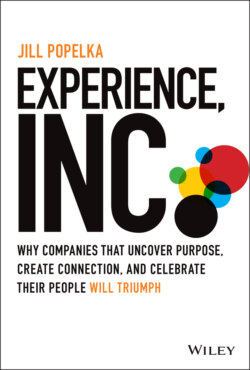Читать книгу Experience, Inc. - Jill Popelka - Страница 10
It's Different Now
ОглавлениеHistorically, we have talked about labor markets from a supply-demand perspective. Companies managed employees as assets. In a scarce labor market, when the number of jobs exceeds the number of qualified candidates, employees have the power. In a surplus labor market, things get better for companies but worse for employees.
Is this a healthy way to think about the relationship between employees and companies? Treating it as a zero-sum battle for supremacy? Is it good for societies to talk about human beings using terms like “surplus”? This is unsustainable if we are to create a healthy society with trusted companies and happy, productive citizens.
We are starting to see a complex shift, brought on by changing global demographics, new economic norms, and advancing technologies. Employees are reevaluating the purpose of work and demanding a new set of rules. Employers are struggling to keep up.
Julia Pollak, chief economist at ZipRecruiter, says, “People don't realize the scale of what has changed. If you take even one chair away in musical chairs, it changes the entire dynamic of the game. That's what we're seeing now, where the 50 percent increase in job openings has given job seekers dramatically more leverage.”1
On one hand, I hear from CEOs and Chief Human Resources Officers (CHROs) about their need for talent. Companies are hiring at record rates, yet simply can't fill roles fast enough. Evolving and expanding expectations have left businesses struggling to appeal to the right candidates. Candidates see career development and talent mobility as a must. Hefty equity grants, once a luxury, are now standard. Freedom policies and remote work are expected. Even something unheard of ten years ago, like pet insurance, can be a deciding factor.
On the other hand, I hear about so many people who can't find a job.
What's the real story? Have we over-automated talent acquisition? Are we trying too hard to apply technology, taking the humanity out of the recruitment process? Are we overreliant on personal networks and underinvested in finding diverse voices? Are we doing a disservice to our own teams and businesses, as well as the candidates in the market?
CHROs are doing incredible work to deliver the increased employee choice and development opportunities required by candidates and employees. They are quickly innovating new tools and processes in the name of employee experience. When supported by leaders, they have done well to drive improved employee engagement and leadership trust. Despite insights from advanced analytics, the constant shifts in their workforces make it difficult to pinpoint one root cause. Even Nobel Prize-winning economists aren't sure. “The Great Resignation,” writes Paul Krugman in The New York Times, “remains somewhat mysterious.”2
We're witnessing many dramatic developments at once:
new technology and the ever-increasing speed, power, and assimilation of automation, including robotics and artificial intelligence, which create new jobs while hastening the extinction of others
greater access to information, including legislated transparency about business practices
growing disconnect between the education and labor markets (According to the U.S. Bureau of Labor Statistics, there are one million more coding jobs in America than workers to fill them.)3
the greatest public health crisis in a century and the ensuing economic fallout from the pandemic, including significant job loss and small business closures
widespread protests over racial and economic issues, leading to greater awareness and action about social justice
extreme political polarization and paralysis
Any one of these forces is enough to meaningfully impact the labor market and society as a whole. We find ourselves at a tumultuous, pivotal moment for business, for organizations, and for society.
I believe, and will argue in this book, that we are entering a more human-centric era for work. And that's good for business.
